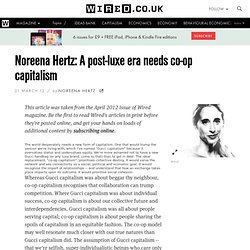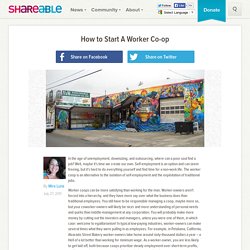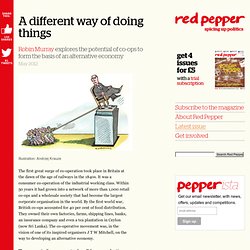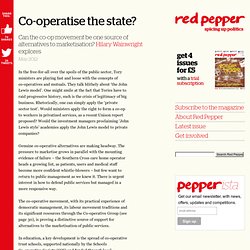

Www.empleo.gob.es/es/sec_trabajo/autonomos/economia-soc/EconomiaSocial/estadisticas/SociedadesAltaSSocial/2013/3Trim/AVANCE_TOTAL.pdf. Worker Cooperative Startup Guides.
Noreena Hertz: A post-luxe era needs co-op capitalism. This article was taken from the April 2012 issue of Wired magazine.

Be the first to read Wired's articles in print before they're posted online, and get your hands on loads of additional content by subscribing online. The world desperately needs a new form of capitalism. One that would trump the version we're living with, which I've named "Gucci capitalism" because it overvalues status and undervalues equity. We're more ashamed not to have a new Gucci handbag (or any luxe brand, come to that) than to get in debt. The ideal replacement, "co-op capitalism", prioritises collective destiny.
Whereas Gucci capitalism was about beggar thy neighbour, co-op capitalism recognises that collaboration can trump competition. Anthropological studies show that societies that have less, share more. Much points to our predilection to do the opposite -- to pull together -- as we saw in similar periods such as the Great Depression and the Blitz.
How to Start A Worker Co-op. In the age of unemployment, downsizing, and outsourcing, where can a poor soul find a job?

Well, maybe it’s time we create our own. Self-employment is an option and can seem freeing, but it’s hard to do everything yourself and find time for a non-work life. The worker coop is an alternative to the isolation of self-employment and the exploitation of traditional jobs. Worker coops can be more satisfying than working for the man. Worker-owners aren't forced into a hierarchy, and they have more say over what the business does than traditional employees.
So what is a worker coop? Courtesy of Rainbow Grocery One of the first barriers to starting a worker cooperative is finding others willing to be part of the initiating group. Once you’ve gathered your initiating group, here are some questions to consider when forming a worker coop: What is your common goal and purpose? Whew! Courtesy of Box Dog Bikes Reading Resources: Worker Coop Development Organizations: Www.uk.coop/sites/default/files/good_news_-_fresh_ideas_2.pdf. Mutual and cooperative models in the digital economy. Invalid quantity.

Please enter a quantity of 1 or more. The quantity you chose exceeds the quantity available. Please enter your name. Please enter an email address. Please enter a valid email address. Please enter your message or comments. A different way of doing things. Illustration: Andrzej Krauze The first great surge of co-operation took place in Britain at the dawn of the age of railways in the 1840s.

It was a consumer co-operation of the industrial working class. Within 50 years it had grown into a network of more than 1,000 retail co-ops and a wholesale society that had become the largest corporate organisation in the world. By the first world war, British co-ops accounted for 40 per cent of food distribution. They owned their own factories, farms, shipping lines, banks, an insurance company and even a tea plantation in Ceylon (now Sri Lanka).
There were similar movements of small farmers and artisans on the continent and in North America, and later in Asia. This way of thinking about an economy did not chime with the model of mass production that became the dominant 20th‑century paradigm for industry as well as for the principal state-centred (and centralised) alternatives on the left. Co-operatise the state? In the free-for-all over the spoils of the public sector, Tory ministers are playing fast and loose with the concepts of co-operatives and mutuals.

They talk blithely about ‘the John Lewis model’. One might smile at the fact that Tories have to raid progressive history, such is the crisis of legitimacy of big business. Rhetorically, one can simply apply the ‘private sector test’. Would ministers apply the right to form a co-op to workers in privatised services, as a recent Unison report proposed? Would the investment managers proclaiming ‘John Lewis style’ academies apply the John Lewis model to private companies?
Media Co-operatives Report Launched - Dave Boyle. I’ve been working for some months on a pamphlet for Co-operatives UK on the opportunities for co-operation in the media, and the report is finally launched today on their site, where you can download it as a PDF.

It’s also been covered in The Guardian by Roy Greenslade, who kindly links to this blog; those readers arriving here from Roy’s piece can see other pieces on media co-ops (links opens all posts tagged ‘media’). It’s been great to spend time thinking, writing and researching this issue. I’m utterly convinced that the reason why people haven’t considered co-operatives is simply because they’re unaware of the possibility.
I’m sure there are downsides to the co-operative approach – nothing is perfect after all – but in two years of thinking and talking to experts across academia, the media and journalists, I’ve yet to come across a negative point, other than the practical steps to move from where we are to where might be. Feel free to comment below if you can think of some! Www.uk.coop/sites/default/files/Membershares_0.pdf. The Little Book of Sharing. Www.uk.coop/sites/default/files/Co-op Capitalism_0.pdf. The Campaign for Co-operation.